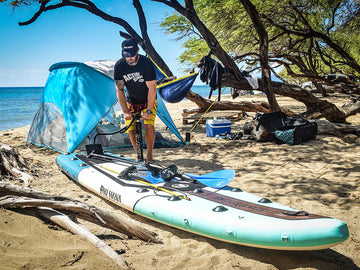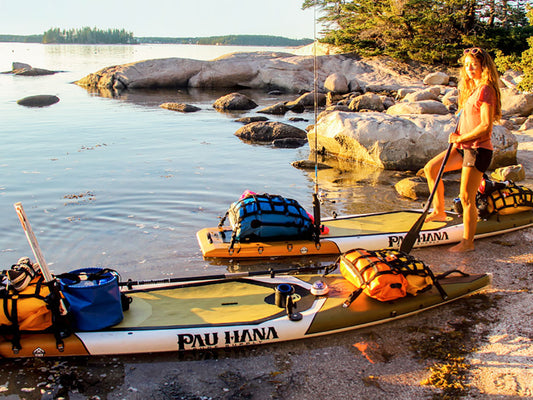There's something uniquely liberating about combining paddleboarding with overnight camping - especially when you’re gliding across Aotearoa’s clear waters to find your own secluded slice of paradise. Whether you're planning a quick overnighter or a multi-day mission, packing smart is key to a comfortable, memorable and safe adventure.
Here’s our go-to gear list for paddleboard camping:
Sleep Setup: Warm, Dry & Lightweight
Sleeping Bag + Drybag Combo
New Zealand’s weather can be unpredictable, even in summer. Opt for a sleeping bag rated for the lowest temps you might encounter. Down bags are lighter and pack smaller, but synthetic options handle moisture better - handy if you're camping in misty or unpredictable conditions. Double-bag your sleeping gear: first in a drybag stuff sack, then into a larger drybag. This two-layer system adds peace of mind if your gear takes a splash or if the weather takes a turn.
Sleeping Mat
A quality sleeping mat adds comfort and insulation from the chilly ground. Inflatable mats like the Therm-a-Rest NeoAir are compact and warm, while foam pads like the Z Lite are virtually indestructible - ideal for rugged DOC campsites.
Shelter: Go Light, Stay Dry
Tarp + Bivvy Bag
For minimalist campers, a tarp and bivvy combo is a lightweight alternative to a tent. Use your SUP paddle as a pole and paracord to rig the tarp between trees or rocks. A bivvy bag adds waterproof protection for your sleeping setup and keeps sandflies at bay. Plus, sleeping under the stars in the backcountry is a bucket list experience.
Camp Footwear: Comfort for the Long Haul
After a day on the water, your feet will thank you for a comfy pair of jandals or Crocs. If you're paddling in shoes, pack dry socks (like Sealskinz) to slip into at camp - just pop them on and wear your wet shoes overtop. It’s a simple trick that keeps your feet warm without adding bulk.
Sun, Bugs & Wildlife: Be Prepared
Sunscreen & Bug Spray
Even on overcast days, UV rays reflect off the water. Choose a reef-safe sunscreen to protect both your skin and the environment. Insect repellent is a must - especially in areas with sandflies or mozzies.
Wildlife Awareness
While New Zealand doesn’t have any big predators, it's essential to be aware of local wildlife, as they can still cause mischief. Store food securely to avoid attracting curious creatures like kea or possums, and always follow the Leave No Trace principles.
Cooking & Hydration: Keep It Simple
Jetboil & Dehydrated Meals
A Jetboil or similar compact stove boils water quickly, perfect for dehydrated meals, tea, or coffee. This setup minimises gear and cleanup - ideal when space and weight is limited.
Water Purification
Carrying all your water isn't practical. Instead you can use a filtration system like the Sawyer Squeeze or LifeStraw, paired with purification tablets, to ensure safe drinking water from streams or lakes.
Safety & Repairs: Expect the Unexpected
First Aid Kit
Tailor your kit to the group's size and the trip's duration. Include essentials like bandages, antiseptics, and any personal medications. Familiarise yourself with basic first aid - it’s invaluable in remote areas.
Repair Kit
A small repair kit can be a trip-saver. Pack patches for your SUP and sleeping mat, duct tape, and a multi-tool. It's better to have it and not need it than the other way around.
Navigation & Communication: Stay Connected
Maps & Devices
Download offline maps and check for cell coverage in your planned area. For off-grid adventures, consider a personal locator beacon (PLB) or satellite messenger like the Garmin inReach. These devices can be quite literally lifesavers in emergencies.
Lighting: Hands-Free Illumination
Headtorch
A reliable headtorch is essential for setting up camp or midnight excursions. Opt for one with adjustable brightness and long battery life, and pack spare batteries or a portable charger.
Hygiene: Respect Nature
Toilet Paper & Trowel
In remote areas, practice Leave No Trace by burying human waste at least 15 cm deep and 100 m from water sources. Use biodegradable toilet paper and carry a lightweight trowel.
Eco-Friendly Soap
Choose a biodegradable soap without any chemicals for washing dishes and yourself. choose one that is effective and gentle on the environment.
Fire Safety: Warmth & Cooking
Firestarter
Pack waterproof matches or a reliable lighter, stored in a dry container. Always check local fire regulations before lighting a campfire, and ensure it's fully extinguished before leaving camp.
Final Tips
Every paddleboard camping trip is unique. Adjust your gear based on the season, destination, and personal preferences. With thoughtful preparation, you'll be ready to explore New Zealand's stunning waterways and remote campsites with confidence.





